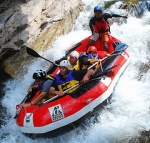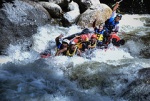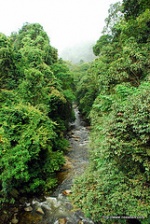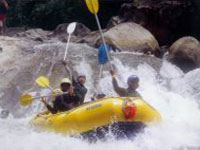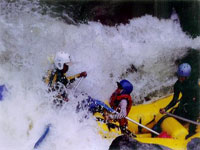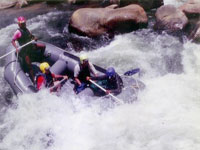Difference between revisions of "White water rafting in Malaysia"
| Line 42: | Line 42: | ||
[[Kedah]], Malaysia | [[Kedah]], Malaysia | ||
*[[Sedim River]] '''Grade III-IV''' | *[[Sedim River]] '''Grade III-IV''' | ||
| + | [[Image:whitewater_sedim_kedah.jpg|150px]] [[Image:whitewater_sedim_kedah03.jpg|150px]] [[Image:whitewater_sedim_kedah02.jpg|150px]] | ||
[[Selangor]], Malaysia | [[Selangor]], Malaysia | ||
Revision as of 12:04, 25 April 2009
Rivers have long been the life blood of the indigenous people of Malaysia. They have served as a means of Transport, a source of food and now, a resource for eco-tourism.
- The must try white water rafting in Malaysia
seasons
- The dry season in Malaysia is a good season for rafting without havig to fight the currents. Smaller rafts are used in the dry season.
- During the raining season, its a good time to ride the rapids as the river swells and the current becomes more powerfull
IMPORTANT
- All participants will be required to sign a Liability Release before departure.
- Children below 12 years may participate with parents or legal guardians
- Participants must be physically fit.
- Jewellery & Contact lenses are not advisable.
What to bring to water rafting
- Change of clothes, Towel, Shoes, Slippers, Sunblock, Insect repellent, Personal toiletries, Waterproof camera (optional).
Pahang, Malaysia
- Jeram Besu white water rafting Grade I-III
- Telom River Grade V
- Kuala Perahu
- Lipis river
- anak Jelai river Grade I-II
- Tembeling river Grade I-II
Kedah, Malaysia
- Sedim River Grade III-IV
Selangor, Malaysia
- Sungai Selangor Grade I-III
Sabah, Malaysia
- Kiulu River Grade II
- Padas River Grade III-IV
Perak, Malaysia
- Sungai Itek (Kampar river) Grade I-III
- Sungkai river Grade I-II
- Singoh river Grade V
Johor, Malaysia
Kelantan, Malaysia
- Nenggiri river Grade I-III
International Grading Scale of River Difficulty
- Grade I - Moving water with a few waves and small ripples.
- Grade II Easy rapids with waves up to 1 meter and wide, clear, channels that are obvious without scouting. Some maneuvering is required.
- Grade III Rapids with high, irregular waves often capable of swamping an open canoe. Narrow passages that often require complex maneuvering.Rapids may require scouting from shore. Boaters in kayaks should have the ability to Eskimo Roll.
- Grade IV Long, difficult rapids with constricted passages and often turbulent waters. Scouting from shore is necessary, and conditions make rescue difficult. Generally not possible for open canoes. Boaters in kayaks should have the ability to Eskimo Roll.
- Grade V Extremely difficult, long and very violent rapids. Highly congested routes which always should be scouted from shore. Rescue conditions are difficult, and there is significant hazard to life in the event of a mishap. Ability to Eskimo roll is essential for boaters in kayaks.
- Grade VI Water is at the extremes of navigability. Nearly impossible and very dangerous. For teams of experts only. Close study must be made ahead of time and all precautions taken.











